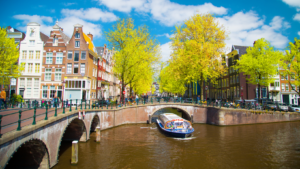Planning a trip to Europe can be both exciting and overwhelming. With its rich history, diverse cultures, and stunning landscapes, Europe offers endless possibilities for travelers. However, navigating through different countries, languages, and customs requires some preparation.
Whether it’s your first time visiting or you’re a seasoned traveler, having a few essential tips can make your European adventure smoother and more enjoyable. From packing smart to understanding local etiquette, these travel tips will help you make the most of your journey across the continent.
Travel Tips For Europe
Researching and planning can transform a chaotic trip into a smooth adventure. Start by identifying the countries and cities to visit, factoring in travel distances and local attractions. A clear route minimizes travel time and maximizes experience.
- Set a Budget
- Check Visa Requirements
- Book Accommodation in Advance
- Explore Local Transportation
- Learn Basic Local Phrases
- Investigate Local Customs And Etiquette
- Check Weather Conditions
- Use Travel Apps
Efficient research and careful planning can vastly improve the travel experience, reducing stress and increasing enjoyment.
 Essential Documents And Requirements
Essential Documents And Requirements
Carrying the right documents is crucial for a hassle-free trip across Europe. Travelers must ensure they have valid passports. Most countries require the passport to be valid for at least six months beyond the intended departure date.
Visa Requirements
Visas are necessary for some countries. Schengen Area visas allow access to 27 European countries for up to 90 days within a 180-day period. Travelers from the US, Canada, and several other countries can enter for tourism without a visa for short stays. Check the requirements based on nationality as they vary.
Travel Insurance
Travel insurance provides medical and trip interruption coverage.
Health Documentation
Bringing vaccination records is advisable, especially in the COVID-19 context where some countries require proof of vaccination or a negative test result.
International Driving Permit
An International Driving Permit (IDP) is necessary for driving in many European countries.
Copies Of Important Documents
Maintaining copies of vital documents provides peace of mind. Include passports, visas, travel insurance, and reservations.
Financial Documentation
Credit cards and sufficient funds are essential.
Emergency Contact Information
List local emergency contacts, embassy contacts, and personal emergency contacts.
Packing Tips For European Travel
Packing efficiently for European travel involves strategic choices to enhance convenience and comfort. Consider these essential tips to ensure a smooth journey.
- Choose Lightweight Luggage
- Pack Versatile Clothing
- Include Comfortable Footwear
- Toiletries and Medication
- Adaptors and Electronics
- Important Documents
- Weather-Appropriate Gear
- Minimalist Approach
Pack Travel-Friendly Accessories
Travel-friendly accessories, like compression bags and packing cubes, organize your suitcase efficiently. Compression bags can shrink bulky items, while packing cubes categorize clothing, making it easier to find specific pieces.
Navigating Transportation
Traveling across Europe efficiently requires understanding your transportation options:
- Trains
- Buses
- Domestic Flights
- Local Transport
- Taxis and Rideshares
- Bicycles
- Car Rental
 Accommodation Options in Europe
Accommodation Options in Europe
Europe offers a variety of accommodation choices to suit different budgets and preferences:
- Hotels
- Hostels
- Vacation Rentals
- Bed and Breakfasts
- Guesthouses
- Boutique Hotels
- Campsites
- Agriturismos
- Monastery Stay
- Couchsurfing
With diverse options, travelers can find the perfect lodging to enhance their European journey.
Cultural Etiquette And Safety
Respect Local Customs: Adhering to customs enhances your experience.
Language: Learning basic phrases like “hello,” “please,” and “thank you” can greatly improve interactions.
Dining Etiquette: Dining customs differ; in France, keep your hands on the table, and in Italy, don’t ask for extra cheese unless offered. Tipping varies—rounding up in Austria is common, while 5-10% is typical in Spain.
Public Behavior: Follow local norms, like waiting for the pedestrian light in Germany and maintaining quiet on public transport in Switzerland. Littering is taken seriously across Europe, often resulting in fines.
Safety Precautions: Stay vigilant to avoid theft, especially in crowded areas like Barcelona and Rome.
Healthcare Access: Familiarize yourself with healthcare systems. EU citizens can use the European Health Insurance Card (EHIC), while non-EU travelers should have travel insurance.
Emergency Contacts: Know that 112 is the universal emergency number in the EU. Keep local police and embassy contact information handy for assistance.
Budgeting And Money-Saving Tips
Traveling in Europe can be affordable with smart planning. Set a clear budget and stick to it to enjoy a fulfilling experience without overspending. Consider budget accommodations like hostels or vacation rentals, and use public transportation or bike rentals to save on travel costs.
Eating at local markets and smaller eateries provides authentic cuisine while keeping expenses down.
Utilize travel apps for discounts, and look for city tourist passes that combine transportation and attraction entry for significant savings. With careful planning and awareness of expenses, you can maximize your European adventure without financial stress.


